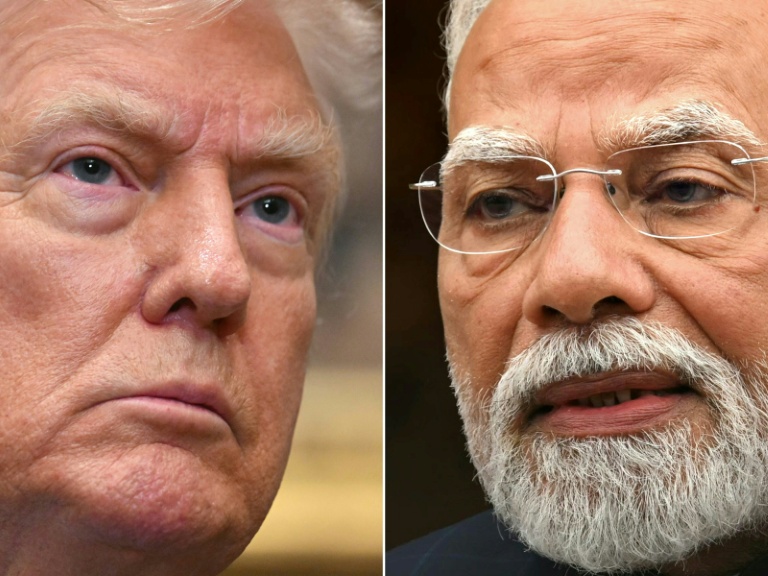World
Modi Proposes Tax Cuts Amid Looming US Tariffs on India

Indian Prime Minister Narendra Modi has announced plans to reduce consumption taxes on everyday goods, aiming to provide significant financial relief for consumers and stimulate demand in an economy facing potential repercussions from US tariffs. This announcement comes as US President Donald Trump has threatened to increase import duties on Indian products from 25 to 50 percent, citing India’s oil purchases from Russia as a contributing factor to the ongoing conflict in Ukraine.
The proposed adjustments to the Goods and Services Tax (GST) are expected to lower costs for consumers across a wide range of products. Currently, the GST operates under a complex four-tier system with rates varying from five to 28 percent. Modi’s reforms would simplify this structure to just two rates: five and 18 percent. This change, referred to by the Prime Minister as a “Diwali gift,” aligns with the Hindu festival when consumer spending typically rises.
Economic Impact and Reactions
Economists suggest that Modi’s tax reform could reduce tax revenues by between $13 billion and $17 billion, potentially bolstering domestic consumption at a critical moment for the economy. Analysts from Emkay Global Financial Services have labeled this policy a “welcome reform,” anticipating that most items currently taxed at the highest rate will be significantly reduced, leading to “sizeable savings” for households.
Modi’s administration has responded to the potential impact of Trump’s tariffs by attempting to cushion the economic blow. The Prime Minister emphasized his commitment to reducing the tax burden on the average citizen during a recent address marking India’s independence. This proactive approach comes as Indian exporters express concerns about declining orders and potential job losses.
The fate of the proposed tax cuts hinges on approval from the GST Council, which includes representatives from various state governments. While this initiative could strain public finances, experts argue it may enhance Modi’s appeal among the middle class, particularly in light of upcoming elections in Bihar, a politically significant state with a population of 130 million.
US-India Trade Relations in Flux
As the deadline for potential tariff increases approaches on August 27, the future of trade negotiations between the US and India remains uncertain. Reports indicate that US negotiators have postponed a planned visit to New Delhi, casting doubt over the likelihood of a trade agreement before the deadline. Economists warn that if a deal is not reached, Trump’s tariffs could hinder India’s GDP growth, potentially falling below six percent this fiscal year.
Despite this, Indian refiners are exploring alternative oil suppliers, including those from the US, West Africa, and Latin America. However, analysts caution that a complete shift away from Russian oil imports is unlikely without a clear policy direction or significant changes in trade economics.
Deepanshu Mohan, an economist at O.P. Jindal Global University, noted that while the GST adjustments are a response to the current trade climate, they also reflect ongoing challenges faced by India’s low middle-income class. The Prime Minister’s strategy to alleviate economic pressures demonstrates a commitment to ensuring that everyday citizens are considered in policy decisions during a turbulent period for international relations.
As the situation develops, the effectiveness of Modi’s tax reforms in countering the potential fallout from US tariffs will be closely monitored.
-

 Politics4 weeks ago
Politics4 weeks agoSecwepemc First Nation Seeks Aboriginal Title Over Kamloops Area
-

 World5 months ago
World5 months agoScientists Unearth Ancient Antarctic Ice to Unlock Climate Secrets
-

 Entertainment5 months ago
Entertainment5 months agoTrump and McCormick to Announce $70 Billion Energy Investments
-

 Science5 months ago
Science5 months agoFour Astronauts Return to Earth After International Space Station Mission
-

 Lifestyle5 months ago
Lifestyle5 months agoTransLink Launches Food Truck Program to Boost Revenue in Vancouver
-

 Technology3 months ago
Technology3 months agoApple Notes Enhances Functionality with Markdown Support in macOS 26
-

 Lifestyle3 months ago
Lifestyle3 months agoManitoba’s Burger Champion Shines Again Amid Dining Innovations
-

 Top Stories2 months ago
Top Stories2 months agoUrgent Update: Fatal Crash on Highway 99 Claims Life of Pitt Meadows Man
-

 Politics4 months ago
Politics4 months agoUkrainian Tennis Star Elina Svitolina Faces Death Threats Online
-

 Sports5 months ago
Sports5 months agoSearch Underway for Missing Hunter Amid Hokkaido Bear Emergency
-

 Politics5 months ago
Politics5 months agoCarney Engages First Nations Leaders at Development Law Summit
-

 Technology5 months ago
Technology5 months agoFrosthaven Launches Early Access on July 31, 2025




















